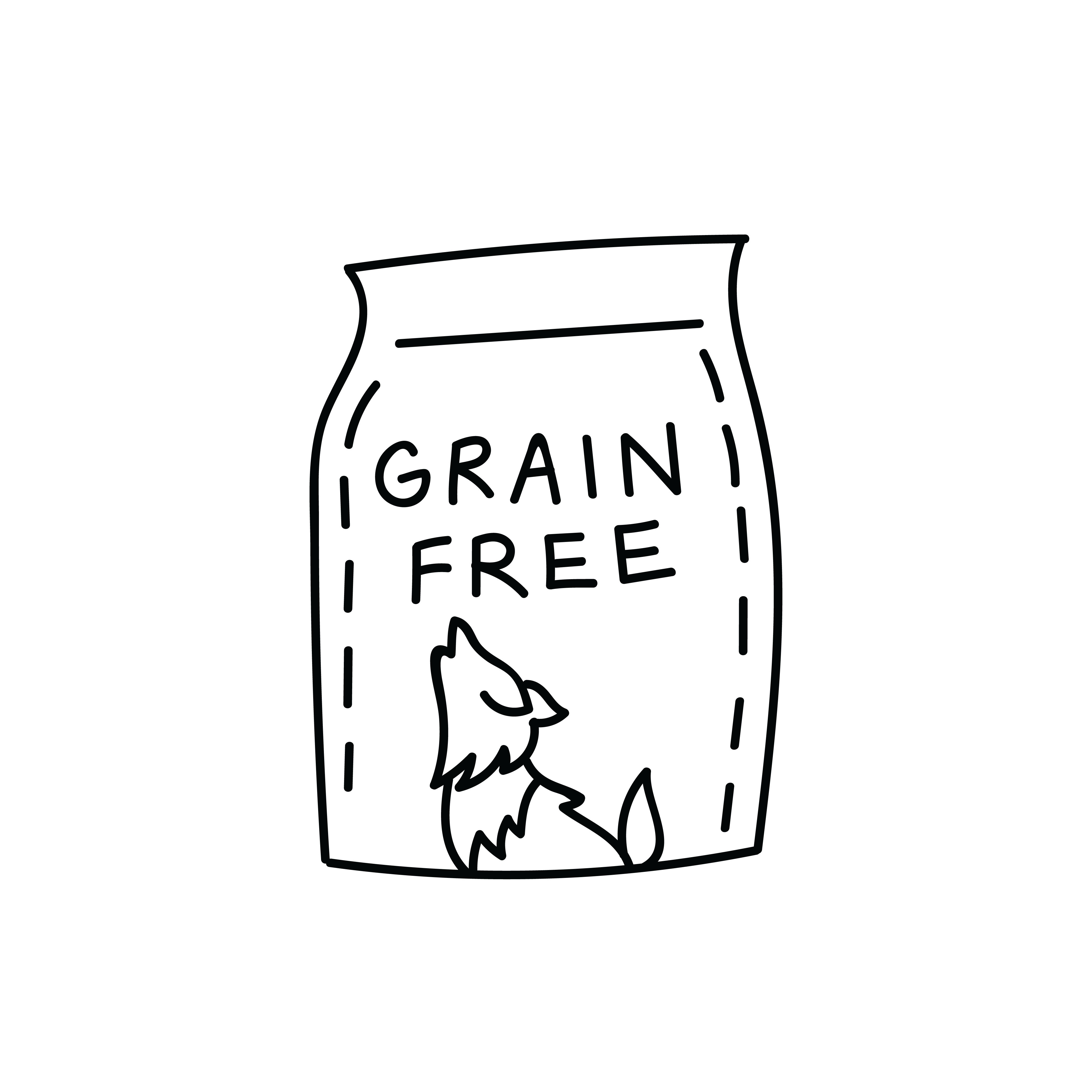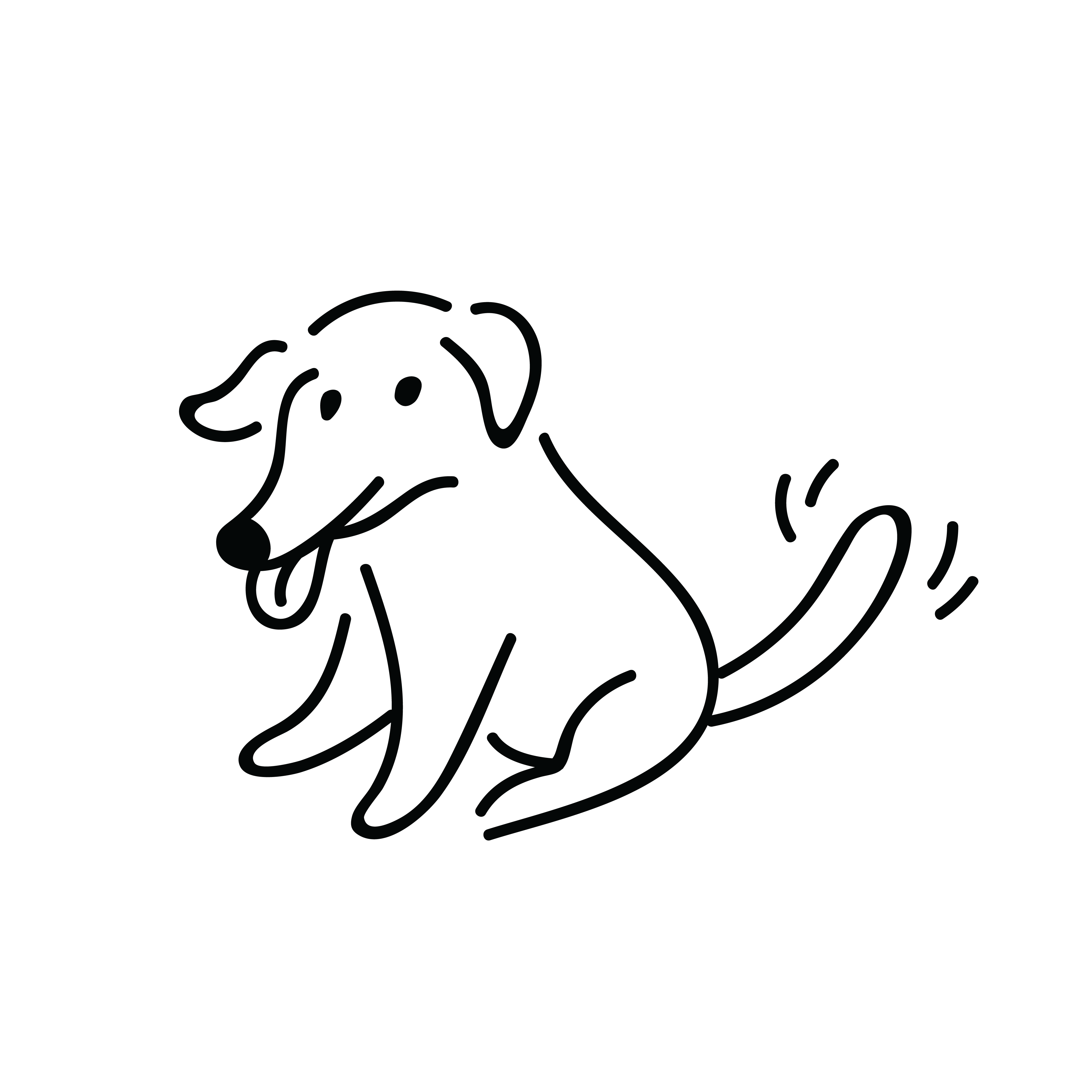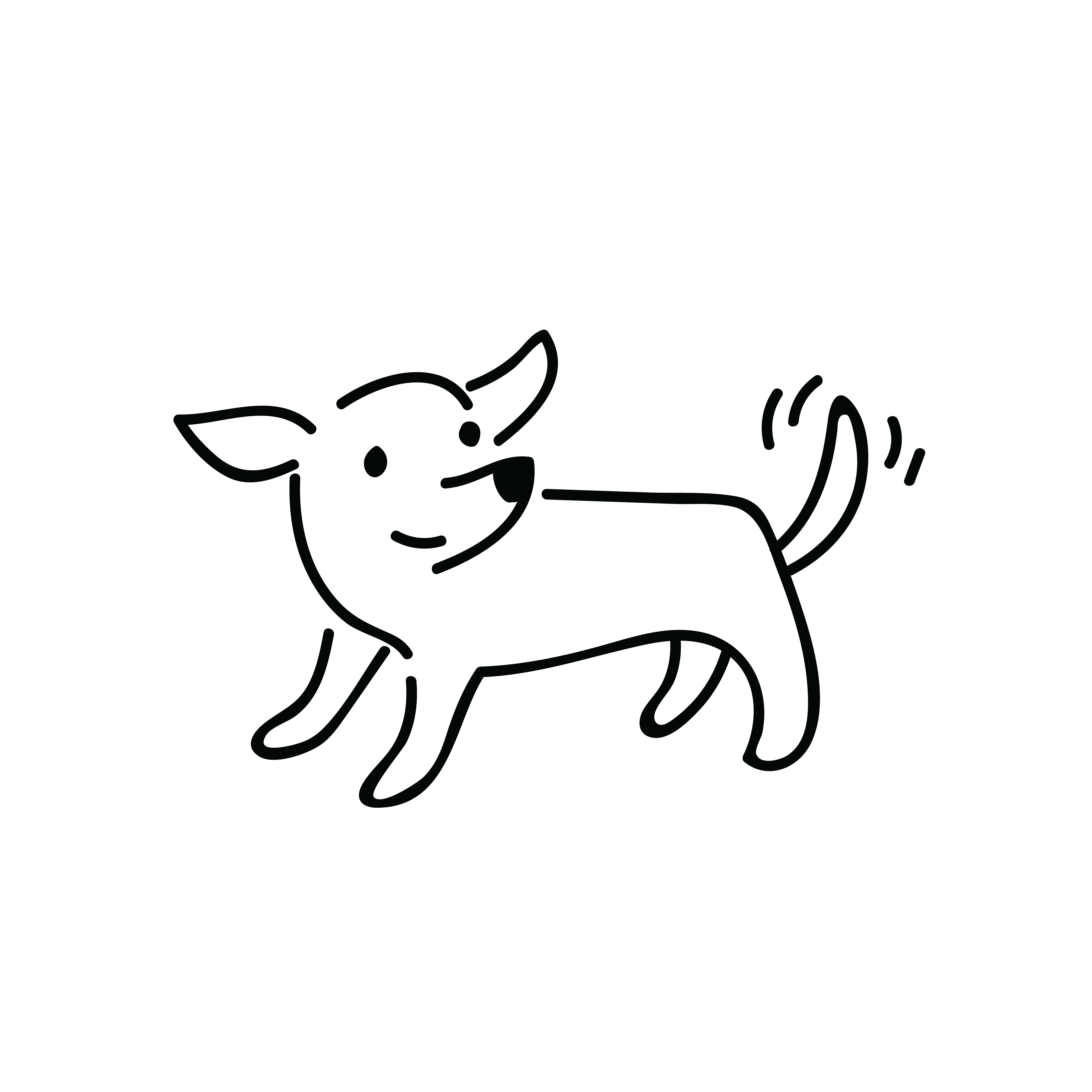The FDA Warns That Grain-Free Dog Foods Can Cause Heart Failure
Here's What We Learned (And Did) After Talking To The World's Leading Animal Nutritionists
Dr. Tory Waxman
Summary
The FDA is investigating a link between grain-free dog foods and a deadly heart condition called DCM. Based on the FDA's research and our own consultations with leading animal nutritionists, to our friends and family, out of caution we recommend to avoid grain-free foods with legumes (peas, lentils, soy, etc.) or potatoes among the first 5-10 ingredients. We removed chickpeas and sweet potatoes from our own recipes and added a small amount of millet (a gluten-free grain) to take a stand against grain-free foods.
What's the status of the FDA investigation?
In July 2018, the FDA opened an investigation into a link between grain-free dog foods and a deadly heart condition called Dilated Cardiomyopathy (DCM). In June 2019, the FDA issued an update, which called out 16 specific brands, and presented a new hypothesis about the problem. Researchers still don't know exactly what's going on (and may not for years to come), but they're zeroing in on the root cause.
Who Are We and Why Did We Write This?
First and foremost, we're loving dog parents who want the best for our scruffy family. We're also a husband-wife team of a practicing veterinarian and an engineer who have spent the past 2 years developing a new dog food. We've worked with some of the world's leading animal nutritionists, food scientists, and veterinarians, and at this crucial moment we want to share what we've learned about dog food with our fellow dog parents.

Beware Legumes
When we spoke to experts a year ago (July 2018) they felt the most likely culprit was legumes (and other grain substitutes), even though the FDA was looking in a differen direction (at taurine and exotic meats). Last week (June 2019), the FDA said that they've shifted their focus to legumes, as well.
The New Hypothesis: Peas, Lentils, and Potatoes Are To Blame
As of July 2019, FDA researchers now think the most likely cause is the grain replacements found in these grain-free foods, specifically high-protien starches like legumes (especially peas and lentils) and potatoes. Their research to date seems to dispel earlier hypotheses related to taurine (affected dogs have normal blood taurine levels) and exotic meats (the most common meat in affected foods was chicken, which is the most common meat).
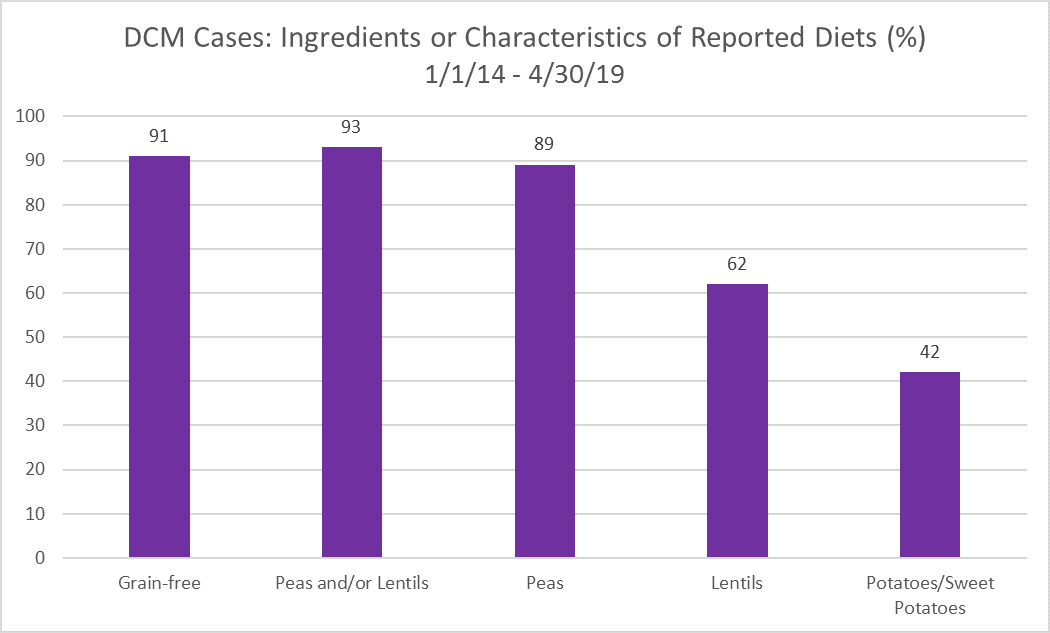
What Action Did We Take At Sundays?
In 2018, leading animal nutritionists told us that they felt that these grain replacements were the likely culprit fo the spike in DCM. Nothing is more important to us than our dogs' health, so we wanted to act quickly on any new information. We changed our recipes to remove all of these ingredients in question (specifically we removed sweet potatoes and chickpeas) and even added a small amount of a gluten-free ancient grain (millet) to take a stand against the harmful and unscientific grain-free trend.
Why Did The Fda Start This Investigation?
Over the past few years, veterinarians across the US noticed an uptick in a rare but potentially deadly heart condition called Dilated Cardiomyopathy. Eventually, vets noticed that most if not all of these dogs were eating Grain-Free dog foods. In July 2018, the FDA officially opened an investigation into a link between grain-free dog foods and DCM. In late June 2018 it published an update about how its investigation had shifted.
The Grain-Free Myth
There are no evidenced-based benefits to grain-free food. If it were only a harmless marketing myth that would be one thing, but now that it's been shown to harm does, it's another.
Are Grain-Free Dog Foods Really Necessary?
No, not for 99% of dogs. Grain-Free dog foods have become extremely popular. Now over 40% of all dog food sold in the US is grain-free. Unfortunately, there is no science behind this popular trend. Less than 1% of dogs of actual grain allergies. Dogs, in fact, have special enzymes to digest grains (that, interestingly, wolves lack). Scientists believe dogs evolved these enzymes from eating human table scraps over thousands of years. Many people feed grain-free foods to dogs with sensitive stomachs, but there is no scientific evidence that these foods are actually better for dogs with sensitive tummies.
If Grain-Free Isn't Necessary, Why is it Popular?
Like many trends in pet food, grain-free began as an echo of human food trends (e.g. low-carb, gluten-free, keto, paleo, etc.). Also, conventional dog foods do use a lot of cheap, high-protein "fillers" to make their food cheaper to produce. Wheat, corn, wheat gluten, and corn gluten are popular choices. Originally, the grain-free message was "we don't use these cheap fillers like wheat and corn; we're grain-free!" Unfortunately, over time, they simply replaced cheap grain fillers, with cheap non-grain fillers like peas, soy, and potatoes.
Why Does Kibble Have So Much Starch In It?
Due to way it's manufactured, kibble requires a relatively high amount of starch in order to make the pieces stick together. In fact, most kibble needs to be less than 25% fresh meat and at least 25% starch. So whether it's wheat, peas, corn, or sweet potatoes, in order to make cost effective foods, dog food companies need to use a lot of protein-rich starches. In addition to binding the food together, they're much cheaper than meat. The problem is that these starches may contain compounds that interfere with the absorption of other nutrients. They're called "anti-nutrients."
What Are Anti-Nutrients?
"Anti-nutrients are natural or synthetic compounds that interfere with the absorption of nutrients." Legumes and starches are known to be high in these "anti-nutrient" compounds. According to several leading food scientists and animal nutritionists who we consulted with, the leading hypothesis for what's causing DCM is that anti-nutrients found in "grain-replacements" (legumes like peas and lentils, and potatoes) are interferring with the absorption of other key nutrients, perhaps amino acids like taurine.
FDA Developments
Like anyone following the scientific method, the FDA has updated its thinking based on new evidence. Here are some major ways in which their thinking has evolved since July 2018:
FDA Revision #1: it's not taurine
Initially, the FDA suspected that a lack of an animo acid called taurine was responsible for this spike in DCM. A similar issue had caused DCM in cats a decade ago. So it was a reasonable starting point (virtually all commercial cat foods now supplement with synthetic taurine). After testing hundreds of foods and dogs for taurine levels, it appears that both the sick dogs and the suspect foods had sufficient taurine levels. Therefore, grain-free foods that boast about supplemental taurine (or high natural taurine levels) are not off-the-hook. Taurine may still be related to the issue, but indirectly. For example, another ingredient (like peas) may be blocking the absorption of taurine.
FDA Revision #2: It's Not Limited To Exotic Meats
The original FDA investigation looked into whether exotic meats were one of the main causes of this DCM outbreak. Further data showed that this was not the case. The most common animal protein in dog food is chicken, and chicken was the most common protein in dogs' diets who had DCM. While some proteins may be overrepresented (particularly lamb), exotic meats are no longer viewed as the sole cause.
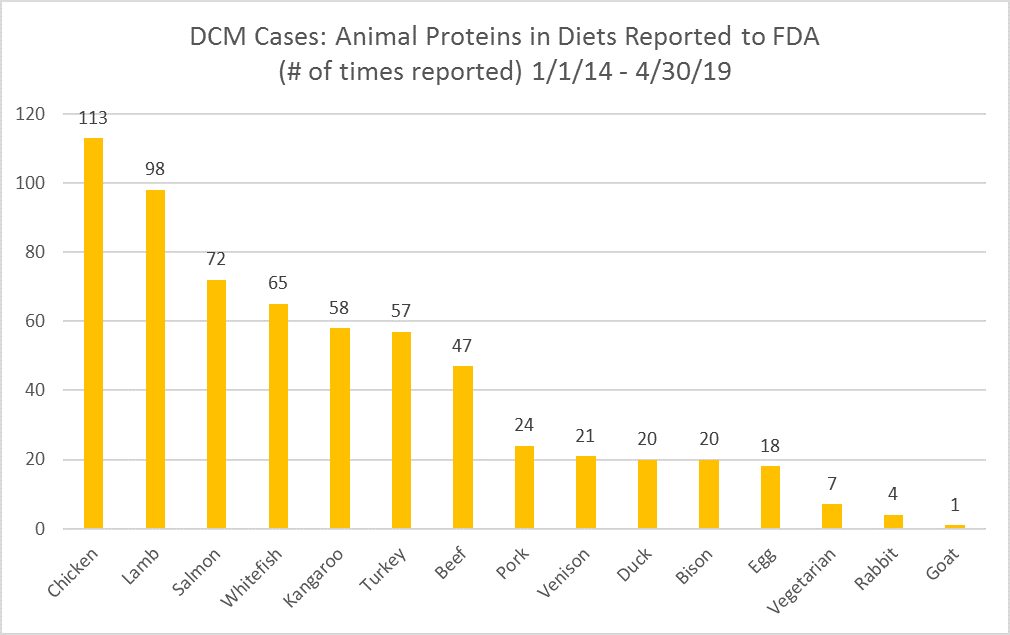
FDA Revision #3: It's Not Limited To Dry Foods (AKA Kibble)
The vast majority of dogs eat traditional dry food that is "hot extruded" (also called "kibble"). Since non-kibble foods are so rare, it took a while for them to show up in the data, but the FDA has found conclusive evidence of DCM in dogs fed virtually all form factors of dog food: home made, raw, canned, freeze-dried, refrigerated and frozen. So the processing method is unlikely to be the root cause, it's more likely related to the ingredients.
How to Pick a New Food
If you want to switch from a grain-free dog food to something else, then we can't blame you. Even though the research is ongoing, and DCM is still relatively rare, given the lack of benefits of grain-free food, it's perfectly reasonable to switch. Here's what we recommend:
Avoid Legumes and Potatoes
Make sure the first 5 to 10 ingredients in your food (the main ones) do not contain: legumes (especially peas, lentils, and chickpeas), or potatoes, or any processed versions of them (like pea protein, potato starch, etc.)
Steer Clear of Grain-Free
There are no proven benefits of grain-free food, and given the potential risks, it's best to simply avoid them. To be clear, though, the current thinking is that it's the presence of grain replacements and not the absence of grain that's causing the issue.
Make Sure It's Complete And Balanced
Unlike people, most dogs get virtually all of their nutrition from a single source (their food). That's why it's essential that their food is "complete and balanced," in other words, that is has the correct amounts of nutrients for your dog to thrive. AAFCO, the regulatory body that oversees dog food in the United States, specificies roughly 50 specific nutrient requirements. Dog food companies should be testing their food to ensure that they meet all the requirements. There are two ways to do this: 1) labratory testing or 2) feeding trials. We'll discuss these more in a moment. Dog foods that are Complete and Balanced will say so on the label. Also, this is why home made diets can be difficult; it's hard to ensure fifty (FIVE! ZERO!) nutrient requirements are being met when it's just you in your kitchen.
If You Want Higher Quality, Try A Non-Kibble
I think it's inappropriate when vets shame their clients for wanting a higher quality food. Today, dogs have a really special place in our lives. We treat them like family and it's ok to try to feed food that's good enough for a family member (but still specially formulated for a dog). A generation ago dogs slept in the backyard, but today many (about 70% in the US) sleep in their parents' beds. So why should they have to eat the same kibble they've been eating for 50 years?
"Non-kibble" or "alternative" kinds of dog foods do not require the high amount of starches that kibble does, so many lack both grains and the potentially dangerous grain-replacements like legumes. These form factors to try include: dehydrated, freeze-dried, cooked/refrigerated, and air-dried (the last of which is how we make Sundays)
Ensure It's Formulated By A Board-Certified Veterinarian Nutritionist And/Or Animal Nutritionist PhD
Even though one of us is a practicing veterinarian, nutrition is a complex topic, which is why we consulted with some of the world's top boarded veterinary nutritionists (who have specialized vet degrees) and animal nutritionists (who have PhD's), not to mention food scientists and researchers.
Feeding Trials Do NOT Mean It's Safe—They're Overrated
Veterinary schools teach that AAFCO feeding trials are the "gold standard" for proving the nutritional adequacy of a dog food. Narrator: They are not. Judge for yourself: In an AAFCO feeding trial, 8 dogs (typically poorly-treated labratory beagles) eat the food in question for 6 months. Basic blood work is taken before and after. If 6 of the 8 dogs have normal blood work and pass a routine exam, the food passes the trial. To us, that doesn't prove much of anything, at least not scientifically. Imagine if pharmaceuticals were tested this way? 6 of 8 dogs basically need to simply survive the food for a few months?
Specific to DCM, since nearly all feeding trials are conducted using specially bred beagles, it's unlikely they would find DCM; beagles were not among the 25 dog breeds identified by the FDA as being most commonly diagnosed. Not to mention, given the relatively low incidence of DCM, and the fact that it may take several years to develop, again, it is unlikely to be revealed in a feeding trial of a mere 8 dogs lasting 6 months.
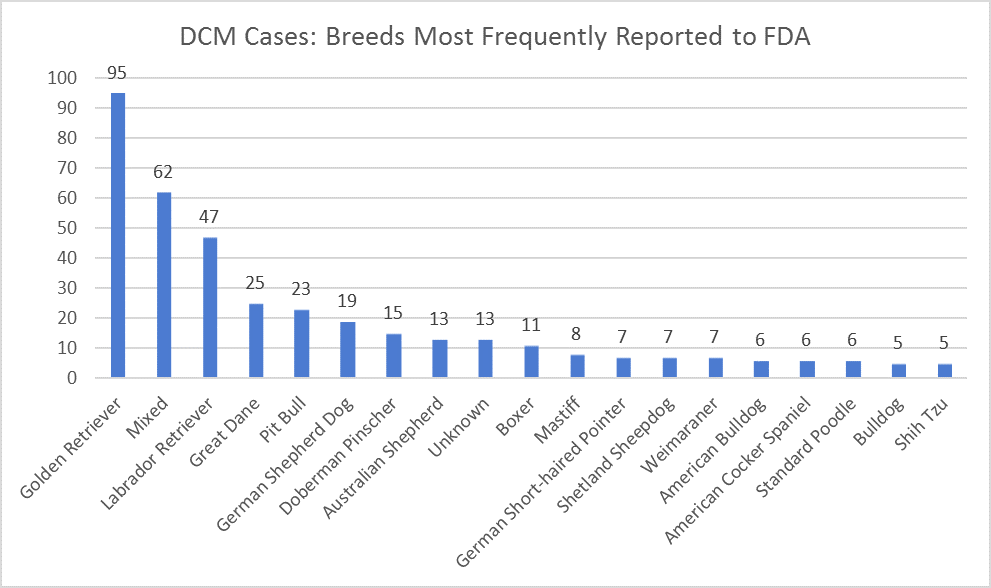
Which Brands Were Implicated?
Nearly all of the leading natural and grain-free brands were implicated: Acana, Zignature, Taste of the Wild, Earthborn Holistic, Blue Buffalo, Nature's Domain, Fromm, Merrick, California Natural, Natural Balance, Orijen, Nature's Variety, NutriSource, Nutro, Rachel Ray Nutrish. You can look up your specific food using this handy tool we built.
Where Do Grain-Free Brands Go From Here?
Given our own experience developing recipes, it's difficult to see how grain-free dog food companies will be able to change their recipes. The ingredients in question (peas, lentils, potatoes) are extremely cheap sources of protein relative to animal meat. Both their starch and protein content are necessary to make kibble at a low cost to the manufacturer. They only have a few options: 1) Move away from grain-free. They can get rid of these grain replacements, but they'll have to go back on years and millions of dollars of marketing about grain-free foods. 2) They can double-down on grain-free, but dramatically increase their prices as they use even more exotic ingredients (which are much more expensive) to replace the peas and potatoes. 3) They can do nothing, but risk the possibility that they continue to hurt dogs. Sadly, for the time-being, #3 seems like the most likely outcome, at least in the coming months.
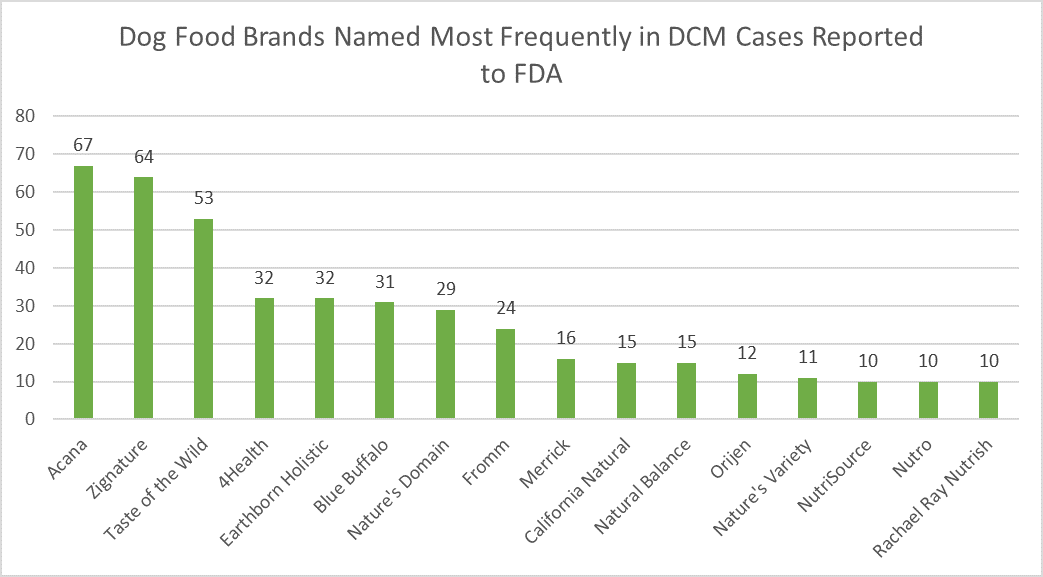
How You Can Help
It's important that dog parents continue to contribute data to the FDA as they proceed with their investigation. You can file a pet food complaint here.

A Word About Sundays
We started Sundays to make it easier to be an awesome dog parent. Food is one of the most confusing and difficult decisions that a modern dog parent has to make, and we aim to make it easier by offering a food with no compromises that's based on the best science and ingredients. It's not about buying our food, it's about buying a food that's healthy (and tasty) for your dog and convenient for you. If you are interested in Sundays, we'd be honored to have you try it, and here's a little bit more about our food:
Steps We've Taken At Sundays
- 1. No legumes, potatoes, or rice to minimize "anti-nutrients"
- 2. Added a gluten-free grain (millet)
- 3. We use the second-most common animal protein in pet food (beef), just in case the exotic meat hypothesis turns out to be true
- 4. Our recipes are formulated by a board-certified veterinary nutritionist and reviewed by an animal nutritionist and a food scientist
- 5. Recipes are complete and balanced by AAFCO standards
- 6. Our food is made with over 80% fresh meat so there is no need for the high levels of starches found in kibble
- 7. Despite the severe limitations of feeding trials, we are currently planning a feeding trial, using more humane procedures than is standard, and hope to have results some time in 2020
